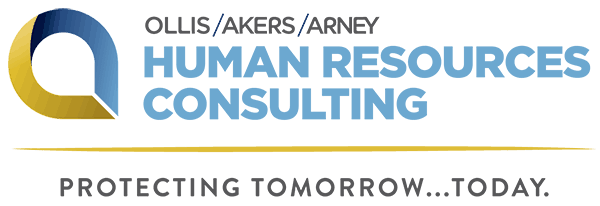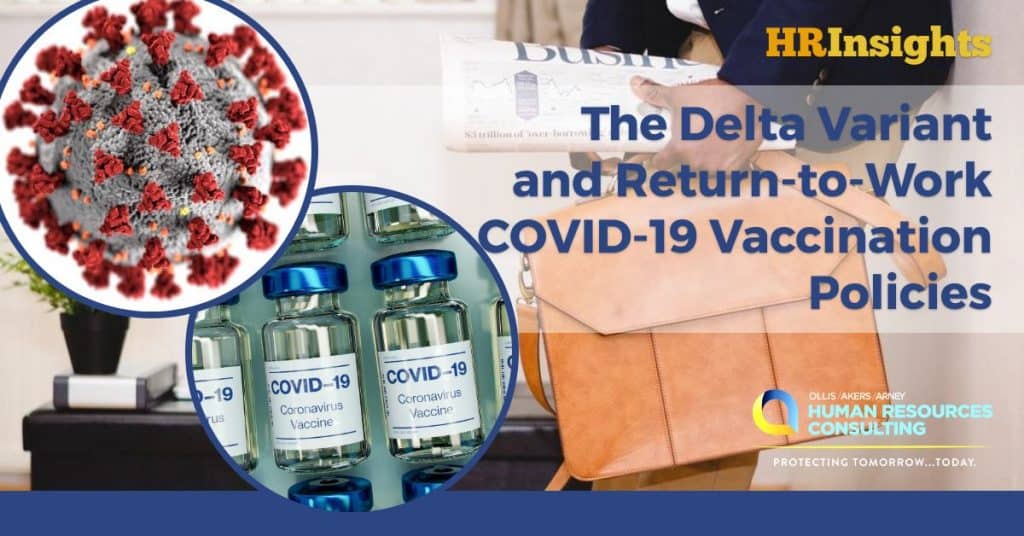As the highly contagious and transmissible Delta variant spreads across the United States and the numbers of coronavirus cases and hospitalizations rise, many organizations are taking action to protect employees. In some cases, they are mandating that employees get vaccinated before returning to the workplace or encouraging them to do so.
For some employers, these actions make sense, as vaccination plays a key role in inhibiting the spread of Delta. According to the Centers for Disease Control and Prevention, vaccination remains the most effective way to prevent coronavirus illness, hospitalization and death. This article explores how employers are including COVID-19 vaccination policies in their return-to-work plans.
Vaccination Workplace Policies
By being creative, flexible and adaptive in their approaches, employers are refining their workplace strategies and finding what works for their businesses and keeps their employees and customers safe. Given the current pandemic status, most employers are encouraging or mandating employees to get vaccinated against COVID-19.
Mandating Vaccination
After months of encouraging employees to get vaccinated, some organizations are taking a rigid stance against COVID-19. Last December, the Equal Employment Opportunity Commission said employers could require employees to get vaccinated as a condition of going to work, with some accommodation exceptions. Any employers considering vaccination mandates should consult with local legal counsel about policies and exceptions for employees who refuse a vaccine based on age, religion, medical conditions or other reasons under federal or state law.
So far, some employers will require on-site employees to disclose their vaccination status and prove they are vaccinated against COVID-19. The following are a few key examples of such employers:
- Google—The company will move its return-to-office date from September to October and require U.S. employees to get vaccinated before working on-site. The technology leader plans to extend the mandate to employees in other countries later.
- Facebook—The social media giant will require vaccination for U.S. employees returning to work on-site. Facebook has already told employees that most could continue working from home beyond the pandemic if their jobs can be done remotely.
- Netflix—As the first major Hollywood studio to do so, Netflix introduced a vaccination mandate for U.S. productions. The new policy applies to all actors and crew who have contact with actors.
- Morgan Stanley—Major investment bank Morgan Stanley told employees to be vaccinated before returning to the New York offices on July 12. Additionally, contingent workers, clients and visitors also are required to confirm their vaccination before entering buildings.
These are just a few significant examples of employers mandating vaccinations in the workplace. The U.S. Food and Drug Administration’s full approval of a COVID-19 vaccine will likely lead to more mandates across different industries.
Encouraging Vaccination
Many employers have become a trusted source of pandemic information for employees, so some employers are choosing to use their influence to encourage vaccination, especially in areas of the country with low vaccination rates. This option is common for employers who aren’t choosing to mandate vaccination.
Layered Prevention Strategies
Even though studies continue to validate COVID-19 vaccines authorized in the United States are effective against severe illness and death from coronavirus infection, current vaccination coverage varies across the United States. Another way to protect against the Delta variant is to implement layered prevention strategies to reduce transmission.
Ongoing Testing
Especially for businesses in which remote work is not an option, coronavirus testing may be ideal for helping create a safe workplace for employees, vendors and customers. Many at-home tests are now available, and employers who opt to increase testing might consider covering the costs.
Consistent testing also helps employers reinforce that employees should continuously monitor themselves for symptoms and stay home if they’re not feeling well.
Reestablished Preventive Measures
Social distancing and mask-wearing may have become less common in workplaces lately. But as Delta variant cases are on the rise, employers might consider bringing back these familiar workplace safety and health measures.
For example, Apple earlier delayed its return-to-work plans for on-site employees. There has been no vaccination requirement yet; however, Apple will require staff and customers to wear masks in many of its retail stores in the United States, regardless of vaccination status.
Delayed Return-to-Work Plans
Another way employers can reduce the risk of COVID-19 and Delta exposure and transmission in the workplace is by delaying employees’ returns or limiting the number of employees in the workplace. Depending on the industry, this is usually done through hybrid work or staggered schedules.
Some employers are already delaying reopening their offices. For example, Twitter already required on-site employees to show proof of vaccination, but the company recently closed its New York and San Francisco offices and paused any further office reopenings.
Still, as of now, many employers report they are still on track to shift remote employees back on-site in the fall. However, it’s critical that organizations track their local transmission rates and use those results to guide return-to-work decisions and timing.
Transparent Communication
With Delta and potential new variants increasing, many organizations and their communities will likely experience rising coronavirus cases in the upcoming months. It’s important for employers to communicate transparently about exposures in facilities or workplaces while respecting employees’ medical privacy.
Conclusion
Employers have a responsibility to protect their employees, customers and communities. Therefore, organizations must continue to monitor the pandemic, assess the local threat of the coronavirus and emerging variants, and weigh their options for minimizing coronavirus exposure in the workplace.
For additional COVID-19 vaccination resources, reach out to Ollis/Akers/Arney Insurance & Business Advisors.
Contact Ollis/Akers/Arney Insurance & Business HR Specialists for additional guidance and strategies for your HR needs.
Our HR Consulting Team
This HR Insights is not intended to be exhaustive nor should any discussion or opinions be construed as professional advice. © 2021 Zywave, Inc. All rights reserved.






